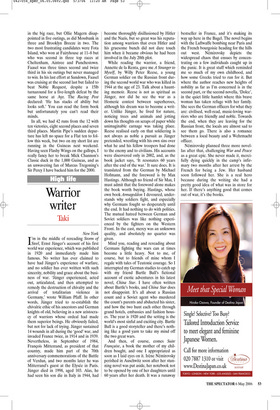Warrior writer
Taki
New York
I’m in the middle of rereading Storm of Steel, Ernst Jünger’s account of his first world war experience, which was published in 1920 and immediately made him famous. No writer has ever claimed to have had Jünger’s experience of warfare, and no soldier has ever written with such sincerity, nobility and grace about the business of war. ‘Jünger experienced, acted out, articulated, and then attempted to remedy the destruction of chivalry and the arrival of totalitarian violence in Germany,’ wrote William Pfaff. In other words, Jünger tried to re-establish the chivalric ethic of his ancestors and German knights of old, believing in a new aristocracy of warriors whose ordeal had made them superior beings. He obviously failed, but not for lack of trying. Jünger sustained 14 wounds in all during the ‘good’ war, and invaded France twice, in 1914 and in 1939. Nevertheless, in September of 1984, François Mitterrand, as president of that country, made him part of the 70th anniversary commemorations of the Battle of Verdun, and two months later he was Mitterrand’s guest at the Elysée in Paris. Jünger died in 1998, aged 103. Alas, he had seen his son die in Italy in 1944, had become thoroughly disillusioned by Hitler and the Nazis, but so great was his reputation among warriors that even Hitler and his gruesome bunch did not dare touch him when it became obvious he had been involved in the July 20th plot.
While reading the warrior, a friend, Annette de la Renta, gave me A Stranger to Myself, by Willy Peter Reese, a young German soldier on the Russian front during the second world war who was killed in 1944 at the age of 23. Talk about a haunting memoir. Reese is not as spiritual as Jünger, nor did he see the war as a Homeric contest between superheroes, although his dream was to become a writer. Unlike Jünger, he lived for nature, noticing trees and animals and jotting down his thoughts on scraps of paper while unimaginable carnage was taking place. Reese realised early on that soldiering is not always as noble a pursuit as Jünger pretended, wrestling with his own sins over what he and his fellow troopers had done to the enemy and to civilians. His accounts were discovered only in 2002, and, as the book jacket says, ‘It resonates 60 years after the end of the war.’ It sure does. It is translated from the German by Michael Hofmann, and the foreword is by Max Hastings. Although no friend of Sir Max, I must admit that the foreword alone makes the book worth buying. Hastings, whose own book Armageddon I devoured, understands why soldiers fight, and especially why Germans fought so desperately until the end. It had nothing to do with politics. The mutual hatred between German and Soviet soldiers was like nothing experienced by the fighters on the Western Front. In the east, mercy was an unknown quality, and absolutely no quarter was given.
Mind you, reading and rereading about Germans fighting the wars can at times become a little heavy. Not to me, of course, but to friends of mine whom I regale with tales of Teutonic courage. So I interrupted my German studies to catch up with my friend Bartle Bull’s fictional account of exotic adventures in his latest novel, China Star. I have often written about Bartle’s books, and China Star does not disappoint. It’s all about a Russian count and a Soviet agent who murdered the count’s parents and abducted his sister, and how the two hunt each other through grand hotels, embassies and fashion houses. The year is 1920 and the setting is the world’s most sinful and exciting city. Bartle Bull is a good storyteller and there’s nothing like a good yarn to take my mind off the two great wars.
And then, of course, comes Suite FranVaise, a book the mother of my children bought, and one I appropriated as soon as I laid eyes on it. Irène Némirovsky perished in Auschwitz soon after her stunning novel was put aside, her notebook not to be opened by one of her daughters until 60 years after her death. It was a runaway bestseller in France, and it’s making its way up here in the Bagel. The novel begins with the Luftwaffe bombing near Paris and the French bourgoisie heading for the hills out west. Némirovsky depicts the widespread chaos that ensues by concentrating on a few individuals caught up in the panic. It is great stuff which reminded me so much of my own childhood, and how some Greeks tried to run for it. But where the author reaches new heights of nobility as far as I’m concerned is in the second part, or the second novella, ‘Dolce’, in the quiet little hamlet where this brave woman has taken refuge with her family. She sees the German officers for what they are: civilised, well-read, music-loving warriors who are friendly and noble. Towards the end, when they are leaving for the Russian front, the locals are almost sad to see them go. There is also a romance between a local beauty and a Wehrmacht officer.
Némirovsky planned three more novellas after that, challenging War and Peace as a great epic. She never made it, mercifully dying quickly in the camp’s infirmary two months after her arrest by the French for being a Jew. Her husband soon followed her. She is a real hero because during the writing she had a pretty good idea of what was in store for her. If there’s anything good that comes out of war, it’s the books.














































 Previous page
Previous page